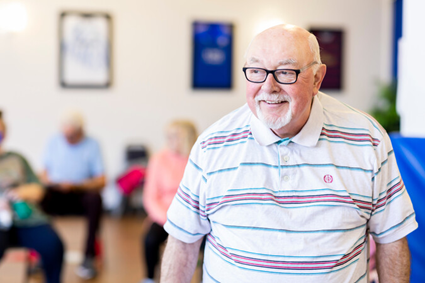Mental health is a key component of overall health and wellbeing [1] regardless of age or gender. Unfortunately, older men often face unique challenges when it comes to their mental well-being. Society expectations, stigmas surrounding mental health and life transitions can all contribute to increased vulnerability. On average, one in eight men will experience depression and one in five men will experience anxiety at some stage of their lives [2].
In this article we discuss strategies for combating mental health challenges in older men, encouraging open discussions, seeking support and promoting a healthy lifestyle.
Raising Awareness
One of the first steps in combating mental health challenges is to raise awareness about the issues amongst older men and society. According to Beyond Blue, unfortunately people over 65 still seem to feel there is a stigma attached to depression and anxiety, viewing these mental health issues as weaknesses or character flaws rather than a genuine health condition [2]. Encouraging open discussions about mental health can help break this stigma and empower individuals to seek help when needed. Promoting the understanding that mental health is just as important as physical health so it is critical to start the conversation and be aware of signs.
Recognising the signs
Recognising the potential signs of mental health issues in older men is a key first step to providing support. These signs may include:
● Withdrawal from social activities
● Changes in sleep patterns
● Loss of interest in hobbies
● Increased irritability or changes in mood
● Constant feelings of overwhelm and or stress beyond normal
● Unexplained physical complaints or increased tiredness
In addition Beyond Blue reports that depression is thought to affect 1 in 5 people experiencing dementia [4]. This is important to keep in mind as the two conditions often share the same symptoms and signs but as they are two different conditions, they require different treatment and response.
By being aware and recognising the signs and symptoms of poor mental health, we can intervene early and offer or seek support and assistance when needed.
Promoting healthy life choices

Engaging in regular physical exercise, maintaining a balanced diet and getting enough sleep are essential for overall well being, including mental health. Healthy life choices can positively impact your mood and mental state. The Australian Government reports that even just a slight increase in physical activity each day can improve your sleep, reduce stress and anxiety, improve concentration and improve your mental health [6].
Additionally, activities like mindfulness meditation, yoga or engaging in hobbies can help reduce stress and promote emotional well-being.
Building Social Connections
Loneliness and social isolation are significant risk factors for mental health issues in older adults, particularly among men. It is important to build and maintain social connections, whether through joining community groups, participating in volunteer work or reconnecting with old friends.
In particular, COTA NSW’s OM:NI groups are an excellent way for men to connect and provide support to and for each other in combating loneliness and social isolation. Social connections can provide a sense of belonging, support and purpose.
Get involved with OM:NI:
 Are you interested in finding out more about OM:NI? Older Men: New Ideas (OM:NI) is about mate-ship, enhancing socialisation and engaging with other men in a safe and accepting environment. OM:NI groups succeed in bringing men over the age of 50 together to meet and chat about personal happenings, community interests and any broader topics the group chooses to focus on.
Are you interested in finding out more about OM:NI? Older Men: New Ideas (OM:NI) is about mate-ship, enhancing socialisation and engaging with other men in a safe and accepting environment. OM:NI groups succeed in bringing men over the age of 50 together to meet and chat about personal happenings, community interests and any broader topics the group chooses to focus on.
OM:NI began in the late 1990s in Wagga Wagga and currently have groups running in Wagga Wagga, West Wyalong, Griffith, Holbrook, Tamworth and Tomaree. COTA NSW are working to expand OM:NI into other areas of NSW to provide more men the opportunity to engage with this great program.
Click here now to discuss with Luke Curtis, COTA NSW’s Engagement and Research officer >> link to Luke’s email: luke.curtis@cotansw.com.au.
Seeking help
Older men may hesitate to seek help due to cultural and societal expectations, fear of judgement, or concerns about being perceived as weak. It is important for men to reach out to mental health professions, support groups or trusted individuals who can provide guidance and understanding.
Crisis support:
- Lifeline: 13 11 14
- Beyond Blue: 1300 224 636
- MensLine Australia: 1300 789 978
By breaking the silence surrounding mental health in older men, we can create a supportive environment that promotes well being and reduces the stigma associated with seeking help. To promote men’s mental health it is very important that we raise awareness, encourage help seeking behaviour, promote healthy lifestyles and build and maintain social connections. We all need to work together and support each other to enable older men to age positively and lead fulfilling and mentally healthy lives.
References:
[1] Australian Institute of Health and Welfare (2022) Mental health: prevalence and impact, AIHW, Australian Government, accessed 22 June 2023.
[2] ABS (2022) National Study of Mental Health and Wellbeing, 2020-21. Australian Government.
[3] [4] Beyond Blue (2023) Getting older and mental health – Beyond Blue
[5] National Ageing Research Institute. (2009). beyondblue depression in older age: a scoping study. Final Report. Melbourne: National Ageing Research Institute
[6] Australian Federal Government (2021) For older Australians (65 years and over) | Australian Government Department of Health and Aged Care, Department of Health and Aged Care, Australian Government.
